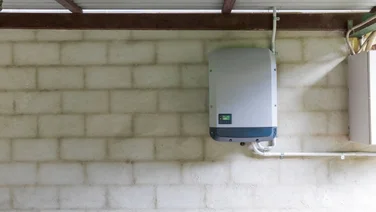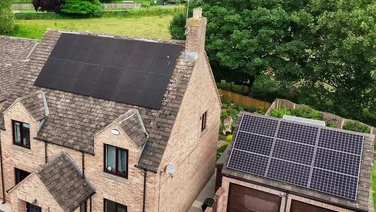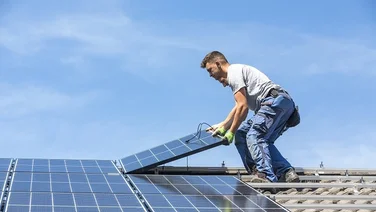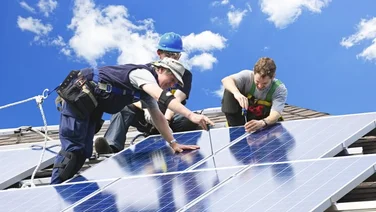We receive a small fee from trusted installers when you request a quote through our site. This helps us keep our content independent, well-researched and up to date – Learn more
- Around 100,000 homes in Wales have solar panels (7.5% of households)
- Solar panels can help you reduce your electricity bill by up to 64%
- It costs an average of £7,138 for a 3.5kW solar panel system in Wales
- The ECO4 grant offers Welsh homeowners up to £10,000 in relief for solar panels

With the cost of solar panels dropping, homes all over Wales are going solar. According to the MCS, around 100,000 households in Wales now have solar panels, meaning over 7.5% of Welsh households are cutting their electricity bills with renewable energy from the sun. In fact, Wales has the highest uptake of renewables per household in the UK.
In this article, we will explain everything you need to know about solar panels in Wales, including their efficiency, costs, and available solar panel grants and support, like Nest, a scheme offering advice and support to Welsh residents. So, if you want to get on the solar bandwagon in Wales, you’ve come to the right place.
If you’re ready to start looking for solar panels, we can help you compare solar panel prices. Enter a few details, and our trusted suppliers will contact you for free quotes.
Two homes with solar panels in Holyhead, on the Isle of Anglesey
Is it worth getting solar panels in Wales?
Yes, solar panels in Wales are worth it because Wales gets more sunshine than the UK average. Welsh homeowners can expect to break even from a solar system in less than 13.88 years, which beats the UK average of 15.66 years. This makes solar panel financing worth it, despite the initial costs.
Of course, the system’s efficiency may vary with the direction the panels face, the topography of the area and the time of the year, but a typical 3.5 kW solar panel system in Wales will generate 2,800 kWh, above average.
Factoring in your grid savings and the excess electricity you can sell via the Smart Export Guarantee (SEG), a three-bedroom home in Wales will, on average, save £477.02 per year – cutting more than 70% off your electricity bills. You can also reduce carbon emissions by around 0.5 tonnes annually.
Solar panels may also help increase a property’s attractiveness, with 69% of people telling our latest National Home Energy Survey they were likely to buy or rent a property with solar panels.
Do solar panels work in Welsh weather?
While Wales receives slightly less sunshine than the England average, it gets more than the UK average, so solar panels still work well in Wales.
Even on the sunniest days, your solar panels must be installed in the right place for maximum efficiency. South-facing solar panels will be more effective yearly than north-facing installations simply because they’ll receive more sun.
Pembrokeshire, which is the sunniest part of Wales, typically receives more than 1,700 hours of sunshine annually. The mountainous areas are the least sunny, receiving less than 1,200 hours a year.
To put that into perspective, the Shetland Islands tend to receive 1,100 hours a year, while the Channel Islands tend to receive around 1,900 hours of sunshine a year. On average, May is when Wales tends to get the most sunshine in any given year, with December receiving the least.
How much do solar panels cost in Wales?
Solar panels cost £7,138 on average in Wales for a 3.5 kW solar panel system, including installation.
| House size | No. of panels needed | Cost | Tonnes of CO2 saved / year | Savings / year | Years to break even |
|---|---|---|---|---|---|
1-2 bedrooms | 6 | £4,283 | 0.3 | £328 | 13.07 |
3 bedrooms | 10 | £7,138 | 0.5 | £546 | 13.07 |
4+ bedrooms | 14 | £9,993 | 0.7 | £765 | 13.07 |
Solar panels continue to fall in price, which is great news as 69% of people ranked cost as the most important factor when evaluating which low-carbon product to purchase.
Working out the total cost of solar panels in Wales depends on a few factors. These include:
- The size (in kW) of the system
- Installation costs
- The type of panels and installer you choose
Live in Wales and ready to buy solar panels?
Generate free, green electricity Reduce your electricity bill by up to 64% Get paid for what you don't use

How many people have solar panels in Wales?
According to the Microgeneration Certification Scheme (MCS), around 100,000 homes in Wales have solar panels, which is around 7.5% of households.
Anglesey, Ceredigion and Powys are the areas in Wales with the highest rate of solar panels. In Anglesey, 16.34% of homes have solar panels, which is the third highest rate of any area in the UK.
In 2021, 28% of Wales’ electricity was renewable, and the government aims for this figure to hit 70% by 2030.
Despite a slower uptick in some areas, Wales is ahead of every area in the UK when it comes to solar power adoption, bar the South West of England. Wales’ appetite for green technology was also demonstrated in our 2023 National Home Energy Survey, where it was ranked the most climate-conscious part of the UK.
Where do you want to install solar panels?
Get startedWhen do you break even on solar panels in Wales?
The average home will break even on solar panels in Wales after 13.88 years.
This compares favourably to the UK average, which is 15.66 years. If you spend more time at home or work from home, your payback period could be even shorter, between 6 and 10 years (depending on energy use).
However, such estimates assume that you get a big enough solar panel system to provide enough electricity to power half of your home’s needs – for instance, a 3.5 kW array for the average three-bedroom house.
You can then sell the rest of your solar energy back to the grid, typically cutting your electricity bills by more than 70%.

What maintenance is needed for solar panels?
Solar panels don’t require tons of maintenance, as the rain naturally cleans the panels, reducing manual upkeep. However, solar panels should be cleaned with water every five years and professionally serviced every 5 – 10 years.
For a comprehensive breakdown of how to maintain solar panels, check out our Complete Guide to Solar Panel Maintenance.
How much space is needed for solar panels?
Most residential solar panels are about 5.5ft long and 3.5ft wide, which means you’ll need about 18 sq ft per solar panel. A standard residential solar panel system requires 100-250 square feet of roof space per kW of installed capacity. A typical 5kW system would need 500-1,250 square feet.
What grants are there for solar panels in Wales?
The UK government offers a few different options for grants, rebates and schemes that can help reduce the cost of solar panels in Wales. These are detailed below.
ECO4
ECO4 was established to support low-income households that are unable to upgrade their homes and heating systems. The ‘4’ comes from the fact that ECO4 is the fourth and final stage of the scheme.
You can get up to £10,000 towards energy-saving initiatives if your home qualifies, including solar panel systems with ECO4.
To qualify, you’ll need to meet specific criteria, including:
- A household income of up to £31,000 per year (for larger families of 4 or more children). If you are a single parent with one child, you’ll qualify for £19,900.
- Being referred by your energy provider, local authority, or doctor
- Receiving certain benefits (including Universal Credit, Housing Benefit, Income Support)
To apply to the ECO4 scheme, all you need to do is get in touch with one of the energy suppliers that are offering it.
You’ll then be invited to a telephone assessment, which involves answering questions about your income, whether you receive benefits and your property’s energy efficiency rating.
The installer will then arrange a date to visit your home and confirm whether it suits the grant.
Additionally, your home must be insulated to a certain level before you can receive solar panels, which might mean you can also get insulation provided through the scheme.
There’s also LA Flex, which is a part of ECO4 and helps local councils expand the eligibility for the scheme for those who might not meet the benefit criteria.
Nest Warm Home Scheme
The Welsh government introduced the Nest Warm Home Scheme to offer free, impartial advice on making your home warmer and more energy efficient and, if you’re eligible, free energy efficiency improvements, including solar panels.
The Nest Warm Home Scheme is aimed at low-income households and offers advice and support on saving energy and money in your home and funded home energy improvements.
Every resident in Wales is eligible for advice and support, but you must meet certain conditions to qualify for funding. These include:
- Your home must be privately owned or rented
- Your home must have an energy performance certificate (EPC) rating of 54 OR a rating of 68 or less if a household member has a chronic respiratory, circulatory, or mental health condition
- You or someone you live with receives a means-tested benefit OR be living in a ‘low-income household’
If you think you meet the eligibility criteria, call Nest on 0808 808 2244 or request a callback using their online form.
An advisor from Next will ask you a few questions to see if you and your property qualify for any free home improvements. If you’re successful with your application, an assessor will visit your home to see what energy efficiency improvements they can offer.
The Smart Export Guarantee
You can make money from solar panels via the Smart Export Guarantee (SEG). The SEG is a form of solar funding that allows you to make a small amount of money from feeding your spare electricity back into the grid.
The best rate available nationwide is 24p per kilowatt hour (kWh) from Octopus Energy. However, this does change over time, so be sure to shop around to get the best bang for your buck.
Licensed electricity suppliers (those with 150,000 customers or more) are required by law to offer an export tariff for people who choose to use the SEG. If you’re interested in applying, you should contact an SEG licensee to apply for a tariff.
VAT reduction
In 2022, the UK government reduced the VAT on energy-efficient systems, including solar panels, from 5% to 0%. This reduction can lower the cost of installing solar panels in Wales by up to £1000 per household.
While the reduction is only temporary and will revert back to 5% in March 2027, this should help encourage more households to adopt the technology and save on energy bills.
There’s no formal application process either, as providers automatically apply the VAT reduction during solar panel installation.
Next steps
If you’re a Welsh homeowner and can afford solar panels, they’re worth getting. They allow you to generate your power while slashing your carbon footprint. That’s a win-win in our books!
But remember, the number of panels you need and the overall cost depend on the energy you consume and the number and size of panels installed.
You can start finding solar panels with our handy (and free) comparison tool. Fill in a few details, and our trusted suppliers will contact you with free quotes.









